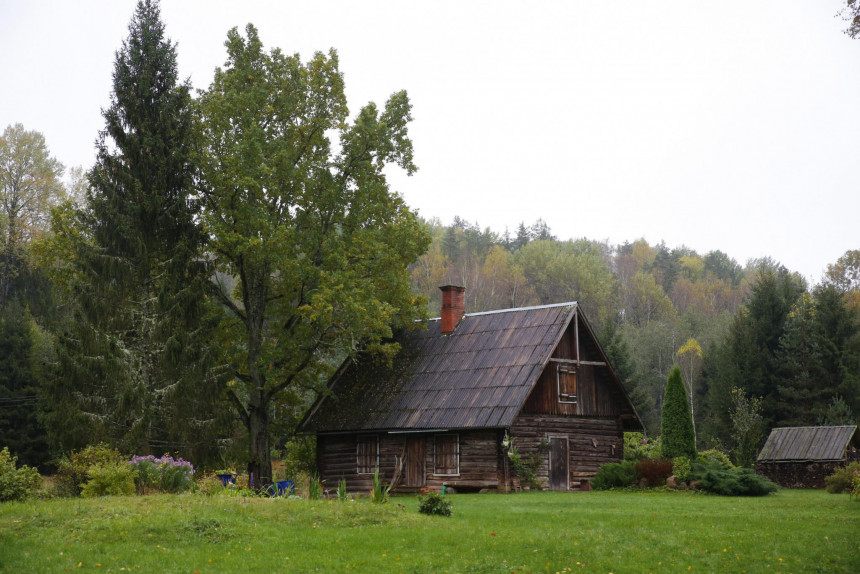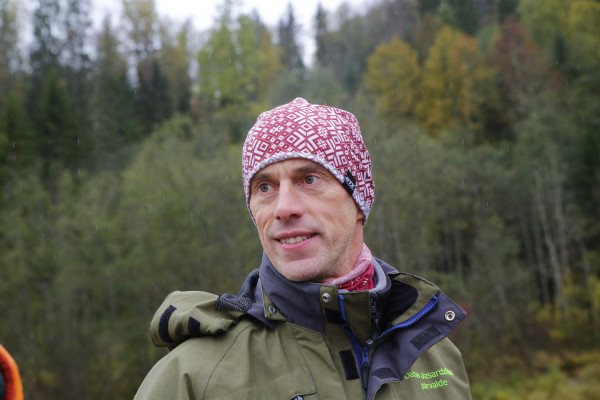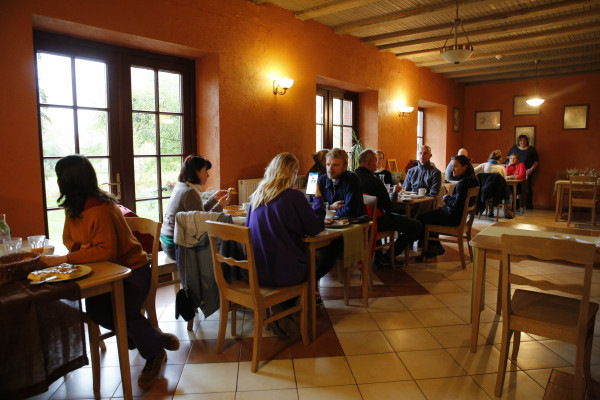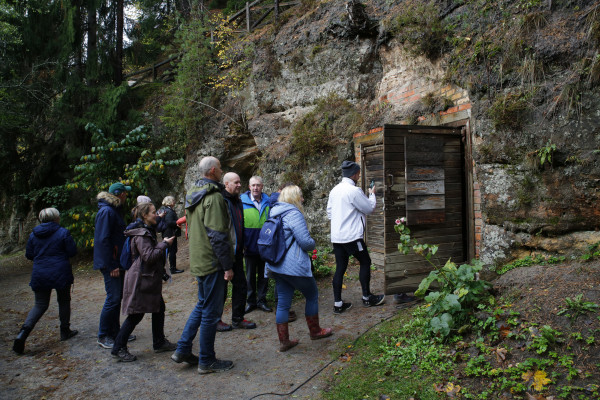In the Covid-19 crisis, the Gauja National Park is experiencing record interest

At a time when some companies were forced to reduce or even suspend operations in the Covid-19 crisis, the workload in some areas even increased due to it. The number of visits to the Gauja National Park has even doubled this year.
The Covid-19 crisis surprised the hotel and tourism business unprepared - due to the closed borders, restrictions and caution in the spring, reservations in tourist accommodation were canceled in a barrage. No company had experienced such a thing, even if they had worked a long time in this business. However, at the same time, forced downtime and unpredictable travel opportunities outside the country allowed Latvians to notice leisure opportunities here.
Double the visits and also double the waste
The Gauja National Park - the largest and oldest national park in Latvia - has always been interesting for both locals and foreign tourists, nature lovers and fans of active recreation, regardless of the season.
Rolands Auziņš, Director of the Vidzeme Regional Administration of the Nature Conservation Agency, says that the number of visits to the Gauja National Park fluctuates at around 1 million per year. This year, due to the pandemic, interest and desire to visit the Gauja National Park (GNP) has doubled. So this year, the number of GNP visits is likely to be a record 2 million. With the establishment of Mežtakas (long distance forest hiking trail crossing the Baltic States), the number of tourists and travelers in the Gauja National Park is likely to increase.
This interest of tourists and travelers is beneficial to the local tourism business, but those working in the sector, like any company in the field, must take into account Covid-19 crisis mitigation measures - gathering restrictions, increased sanitation, disinfectant availability, etc.

Rolands Auziņš, on the other hand, is worried that with the influx of tourists, the amount of waste that has to be removed from the park has almost doubled. Not all places in the national park have garbage cans that can be accessed by garbage truck. Where this is not possible, garbage bags are carried by the park staff to the road where the car can reach. "We pay thousands for waste removal every year. This year the total amount will definitely be higher than in other years,” R. Auziņš estimates.
The Nature Conservation Agency urges tourists to not leave wrappings, empty bottles, disposable dishes, etc. after visiting nature.
Booking at the last minute
Mežtaka, which is part of the European long-distance hiking route E11, winds all over the Baltics. It also crosses the Gauja National Park. The length of the forest trail along the GNP is about 100 kilometers, and the trail in the park area is divided into five sections. The longest section of the northern part of Mežtakas is 26 km - it connects Cēsis with Līgatne. Around the middle of this section of the trail is the countryside hotel Kārļamuiža. It is a place where you can relax or spend the night if the walk on the trail has left you feeling worn out.

However, it is not only hikers who visit Kārļamuiža, of course. It is a popular holiday destination for those who travel around Latvia by bicycle or car, or simply want to spend a holiday in a picturesque and peaceful place. The owner of Kārļamuiža Baiba Stepiņa tells Neatkarīgā that the number of people who want to travel and spend the night has not stopped even during the crisis, although, of course, some reservations were canceled when restrictions began and the borders were closed.
"We did not lack work even in the hottest point of the crisis, that is, when an emergency situation was declared in Latvia. Perhaps our location helped us - in nature, outside the city, because such places were and are in demand these days. Hotels in cities might have had a harder time,” admits B. Stepiņa. However, the crisis has also introduced some changes in Kārļamuiža. First of all, the type of customers has changed - due to the closed borders and the implemented security measures, there have been far fewer foreign guests this year, but many more local holidaymakers, tourists and Latvian travelers. Secondly, almost all bookings are currently made at the last minute. In the past, travelers, especially foreigners, booked accommodation with time to spare, which allowed the hosts to prepare for the reception and catering of guests, but now everything is happening at the last minute. "Usually we already knew in March how many guests we would receive in the summer, how long they plan to stay, whether they want breakfast, dinner, etc. This summer, bookings or changes took place at the last minute, including cancellations - unfortunately at the last minute. This, of course, made it difficult for us to work, because we are not in a city where products can be bought quickly if there is a need. We plan everything ahead of time and do not create huge product reserves so that everything we serve to our guests is fresh,” said Baiba.
According to her,
the most difficult part of this Covid-19 time is that the information about what safety procedures or restrictions companies have to follow to receive and serve guests is constantly changing. Also, guests are often unaware of what they can and cannot do so as not to violate the gathering or other restrictions.
"We never entertained thought we could stop working because of the crisis. It is our only source of income and therefore we cannot afford it. The loan payments must continue, and there are promises that must be kept. Investment plans were made for this year, and also ones that we could not postpone. So we had to adapt,” said Baiba Stepina.
Kārļamuiža continues to operate and is waiting for guests. Entering it after a walk along the Mežtaka, one is surrounded by warmth and coziness. Juris Smaļinskis, a tourism and environmental specialist at Lauku ceļotājs/Baltic Country Holidays, calls Kārļamuiža a hiker-friendly place. He reveals that it is planned to create a special certificate, which would be granted to tourist accommodation, shops, catering establishments, so that hikers would know that in this place it will be possible to warm up, dry clothes or shoes. Kārļamuiža would definitely get one.
Locals instead of foreigners
One of the stops of Mežtakas is Līgatne. From here you can go either towards Sigulda, measuring about 24 kilometers on foot, including part along Līgatne nature trails, or towards Cēsis - along the mentioned Cēsis‒Līgatne 26 km long trail section. You can also go on these trails in the opposite direction, concluding the hike in Līgatne. However, regardless of whether this city is a starting, ending or just a stopping point, it is worth looking at the most beautiful and interesting places in Līgatne.

The owner of Līgatne winery Ainars Vanags warmly welcomes guests and leads them deeper into the cave. Yes, in the cave, because in one of the Līgatne sandstone caves there is a tasting hall of Līgatne winery. The Līgatne winery makes wines from fruits, berries and even flowers collected in the vicinity of the Gauja National Park, as well as infusions, liqueurs and even stronger drinks.
The company has not really felt the Covid-19 crisis in terms of receiving tourists, as the lack of foreigners was compensated by greater local interest, as well as travelers from neighboring countries, such as Lithuania.
"Exports stopped completely. Apple wines are very highly appreciated in Asian countries, and the ones made in Latvia are very well-liked. As a result of the Covid-19 crisis, some hotels and restaurants were closed, which also affected beverage producers. We work as we can and try to make the locals and travelers happy,” says Ainars Vanags with optimism.
He is proud that the President of France, Emmanuel Macron, when he arrived in Latvia at the end of September, was treated to wines made in Latvia, including the Līgatne apple ice wine. According to Ainars, the French president liked it. How is the wine so highly valued by the French President actually made?
“Apples were harvested in the Gauja National Park in late autumn. In winter, they are left outside in the freezing cold to increase the natural sugar in the apples. After frost the juice is squeezed from the apples and the wine is fermented for about 12 months. No sugar is added during the wine-making process; only natural sugar contained in apples is used. No water is added. It takes about a sack of apples to make one bottle of apple ice wine,” says Ainars Vanags.